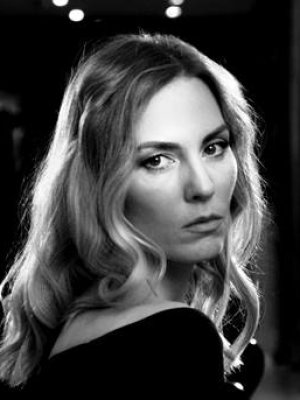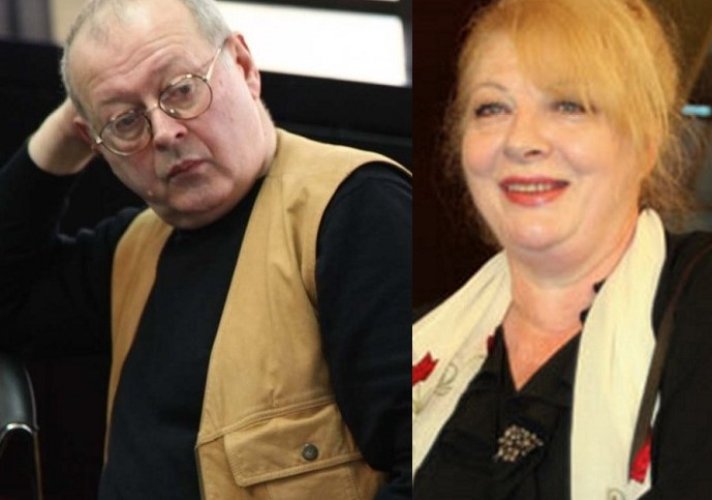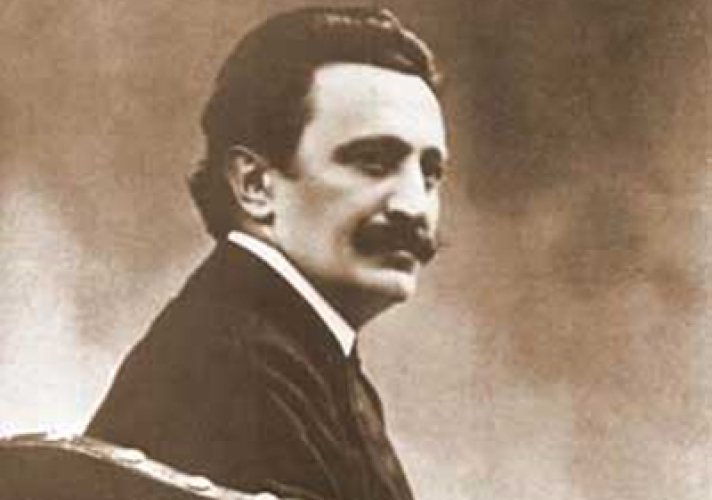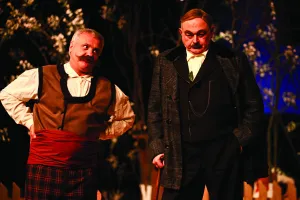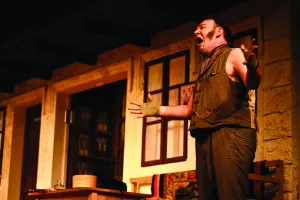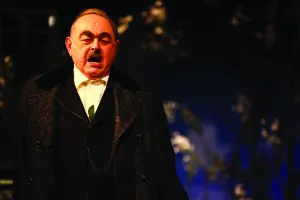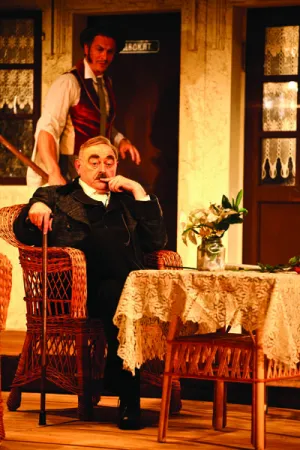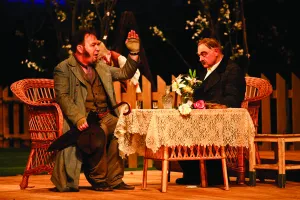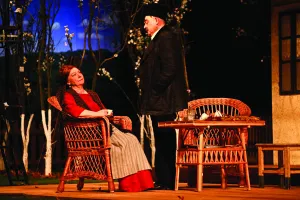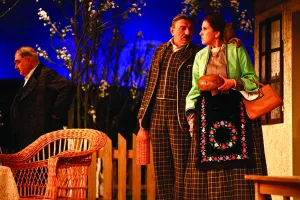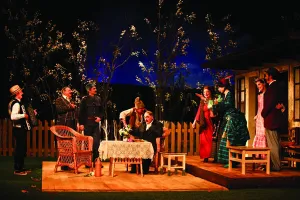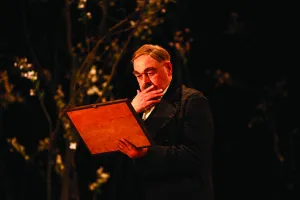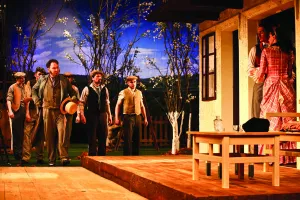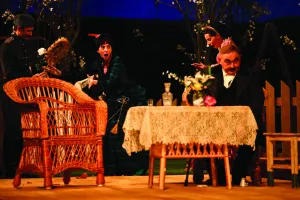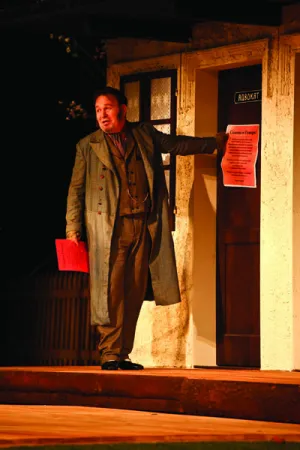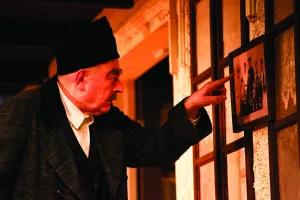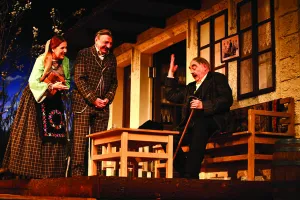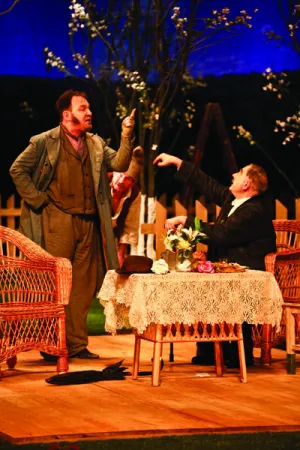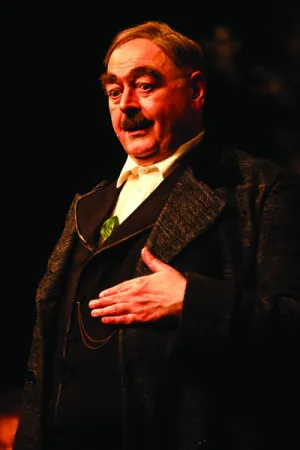A member of the parliament
comedy by Branislav Nušić
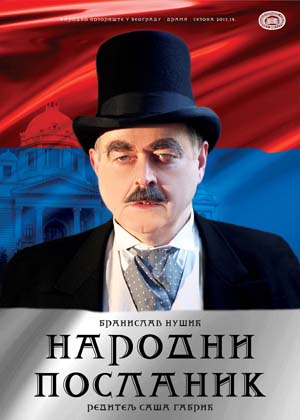
A NOTE BY THE STAGE DIRECTOR
On this great occasion – celebration of 150th anniversary since the birth of the greatest, the wittiest and the bravest… here is A Member of the Parliament in the National Theatre, after 44 years. I do not know why it took so long and I do not want to speculate on this, though many things come to my mind. One thing is certain; this is the right play, at the right time and in the right place. In order to be perfectly clear, let me remind you what some of the characters say in this joke in three acts, as Nušić called it.
Enough is enough
Didn’t we give him the list of our citizens who are in prison? He pardoned only his brother-in-law… Then he went on to give jobs to everybody in his family and they now hold all offices starting from the priest to municipal animal-carcass collector. If there is someone working on the municipal weighing scale, it is a relative of his, if someone is a municipal notary in the town hall, it is a relative of his. Enough is enough. We all have relatives who could take offices and who are in jail. Right! Oh, I wish he wasn’t in our party, so we could…
People’s trust
It is only a commodity, just like everything else. You place it on the scale, you see how much it weighs and then you pay for it.
Election campaign
I hope you don’t think that you should tell the truth to people during the election campaign. You would see what would happen if you told the truth!
Promise! Promises don’t cost a thing.
Traitor
In a situation when two men cannot stand each other, the other man has to be the traitor of the country. This is how the things are in politics. After all, do not think that this is the only accusation you will get, they will accuse you of being something much worse.
Assembly
If you speak in favour of the government, the opposition will say that your speech was stupid, and if you speak in favour of the opposition, the government party will say that your speech was stupid. In any case, you cannot avoid giving a stupid speech.
Government
How shall I put it… you see, it seems very easy to say bad things about the government. These things come natural. This is probably why everybody, who says bad things about government, speaks so well. But, my son, try to speak nice about the government and then you’ll see how difficult that is…
People’s appreciation
And, this is it, this is the people’s support – when the crowd is shouting and they do not know why.
If I am elected
Since I’ve decided to become a member of the parliament, I have been experiencing a sort of sadness.
 BRANISLAV NUŠIĆ
BRANISLAV NUŠIĆ
1864 He was born as a fourth child to a well-off family of merchant Djordje Nuša and his wife Ljubica on 8th October in Belgrade. They named him Alkibijad. At the time, they lived in Kralja Petra Street in the house situated exactly where the National Bank of Serbia now stands.
1870 The father is forced to move the family to Smederevo after going bankrupt.
1870–74 He attends elementary school in Smederevo, while his father is keeping a shop.
1874–82 He attends Gymnasium (a grammar school; in 1875 he is forced to repeat the first grade) then he becomes an apprentice for a short time in Pančevo and in 1876 he continues his education in a Gymnasium in Belgrade. Together with his cousin Jevta Ugričić he becomes “infected” with theatre.
1882 He graduates and starts using the name - Branislav.
1883 He becomes acquainted with Vojislav Ilić. The acquaintance is his ticket to the best known centre of literary life in Belgrade at that time – the home of Ilić family, where he shall read his first play Narodni poslanik (A Member of a Parliament).
1884 He studies law in Graz, Austria.
1885. He comes back to Belgrade and continues his studies. Nušić volunteers and fights on Serbian side in a war between Serbia and Bulgaria.
1886 He graduates from law school and writes Pripovetke jednog kaplara (Stories of a Corporal).
1887 He publishes a controversial poem Dva Raba (Two Funerals) and criticizes the rule of King Milan and gets sentenced to two years of imprisonment.
1888 He spends a year in a prison in Požarevac and manages to write Protekcija (Protection).
1889 He becomes a civil servant. The Minister of Foreign Affairs appoints him to consulates in Bitola, Priština, Skopje and Serez. Nušić spends the next ten years in diplomatic service.
1891 Nušić and Dragutin Ilić restart and edit Preodnica (An Advance Party).
1893 Nušić marries Darinka Đorđević, a merchant’s daughter, whom he met as a niece of the Consul Bodi in Bitola. The same year, Nušić is appointed a consul in Priština, where Vojislav Ilić works as his clerk.
1899 He is a member of editorial staff in Zvezda, a magazine run by Janko Veselinović.
1900 Nušić is appointed a Secretary in the Ministry of Education and shortly afterward, he becomes a dramaturge and acting manager of the National Theatre in Belgrade.
1901 He edits Pozorišni list (Theatre News).
1902 Nušić retires as per his own demand, because of his dissatisfaction with not being appointed the manager of National Theatre. He gets reinstated and appointed the commissioner for postal and telephone company, which he refuses and gets re-retired. He takes an active part in establishing the Serbian Writers and Artists Association.
1903 He is appointed the Head of National Propaganda Department with the Government as an authority on situation in Serbian territories still under Turks. After the coup of 29th May, he gets retired yet again.
1904–1905 Nušić is a Manager of Serbian National Theatre in Novi Sad.
1906–1907 He is an assistant dramaturge in the National Theatre in Belgrade.
1905 Nušić and Mihajlo Sretenović establish Malo decje pozoriste (A Small Children’s Theater) in Belgrade (a predecessor of Roda Theatre founded in 1937).
1907 He elaborates a study on foundation of Montenegrin National Theatre in Cetinje for King Nikola.
1905–1910 He publishes his famous “conversations” in the Politika Newspaper and signs them as Ben Akiba.
1910 Nušić is sentenced to three months of imprisonment for his article Narod i dinastija (The People and the Dynasty) commenting on the relationship between King Petar and Prince Đorđe. He does not serve this sentence on account of the upcoming war. He was given a medal of Sveti Sava and White Eagle.
1908–1912 Nušić is involved in journalism. He is an assistant and editor of the following magazines: Samouprava (Self-Management), Tribuna, Belgrade Newspapers, Daily Newspapers, Guard; as well as with humoristic newspapers such as: Brka (Moustaches), Ćosa (Bald), Satire, Telephone, etc.
1912 He is appointed the first Head of liberated Bitola (during the Balkan war).
1913 Nušić establishes a theatre in liberated Skopje and becomes its manager.
1915 Skopje. His daughter Margita Gita gets married to a writer Milivoj Predic; and the son Strahinja Ban dies while fighting with Bačka company. Nušić retreats with the Serbian army through Albania to Corfu.
1916–1917 He lived in Italy, France and Switzerland. He elaborates The Plan to Rebuild and Rejuvenate National Culture after the War and sends it to the Minister of Education to Corfu in 1917.
1918 He goes back to his duty in Skopje.
1919 Nušić becomes the first Head of Art Department (later the Ministry of Culture) in the Ministry of Education in Belgrade
1922 He got denounced by the church, because of his play Nahod.
1923 He is dismissed from position of the Head of Art Department. He received a medal of Sveti Sava I Class.
1924 A grand celebration of his sixtieth birthday and forty years’ writing anniversary.
1925–1928 Nušić becomes a head of Sarajevo Theatre; he writes Ramadan Nights and uses the pseudonym Halil Delibašić.
1929 Nušić is a librarian of the National Assembly. He finally retires. He receives a medal of the Officer of the Legion of Honour.
1930 He acts in a film Paramunt Review in Vienna. He teaches Rhetoric at the Military Academy and writes a book on the subject. The book is still in use.
1931 Nušić signs a contract with a well-known Belgrade publisher, Geza Kohn, regarding the printing of all his works.
1933 He becomes a member of Serbian Royal Academy.
1934 Upon his first major health crisis, he moves with his family to Hvar Island to recuperate.
1935 Upon the premiere of Bereaved Family in Sofia, he gets a Bulgarian medal of Citizen’s Accomplishment.
1936 After many relocations, he purchased a piece of land and built a house in 1 Rosalia Morton str. (now - Shakespeare str.) and moved in on 15th September.
1937 Nušić gets an operation in Vračar Sanatorium in Belgrade. At the founding assembly of Association of Artists, Scientists and Writers, held on 5th December, he gives a speech and appeals to solidarity against fascism – the famous Cultural Testimony.
1938 Branislav Nušić died in Belgrade, on 19th January. He was buried in his family crypt in Novo groblje (New Graveyard) in Belgrade.
 SAŠA GABRIĆ
SAŠA GABRIĆ
Born on February 17, 1967 in Subotica. He completed his primary and secondary school, as well as his university studies at the School of Economics, in Subotica. He graduated from the Academy of Art in Novi Sad in 1994, in the Multimedia Directing Department. He is a freelance artist since 1996. He lives and works in Belgrade. He has directed a namber of professional performances, operas and several short and documentary films. His professional credits include plays:
A Portrait of the Artist as a Young Man by James Joyce
Fuente Ovehuna by Lope de Vega
The Three Sisters by Anton Pavlovich Chekhov
Rapid Dreams by Ady Endre
Timon of Athens by William Shakespeare
Drums in the Night by Bertolt Brecht
The Rose Garden by Aleksandar Popović
Kaspar by Peter Handke
Corionalus by William Shakespeare
Joystick, based on James Joyce’s Ulysses
Death of a Salesman by Arthur Miller
A Wedding in the Bathroom by Milorad Pavić
Suspicious Person by Branislav Nušić
and operas:
Don Pasquale by Donizetti
Didi and Eneas by Henry Purcell
Premiere performance
Premiere, 31th May 2014 / Main Stage
Director Saša Gabrić
Set Designer Boris Maksimović
Costume Designer Marina Vukasović Medenica
Lighting Design Milan Kolarević
Dramaturge Zoran Raičević
Stage Speech Dijana Diklić
Producer Ivana Nenadović
Premiere Cast:
Jevrem Prokić Boris Komnenić
Pavka, Jevrem's wife Radmila Živković
Danica, their daughter Kalina Kovačević / Nada Macanković
Spira, Jevrem's brother-in-law Milenko Pavlov
Spira's wife Olga Odanović
Ivković, a lawyer Branislav Tomašević
Gospa Marina, Ivković's aunt Anastasia Mandić
Sekulić, a clerk in the police station Dimitrije Ilić
Jovica Jerković Lepomir Ivković
Sima Sokić Predrag Miletić
Sreta Branko Vidaković
Mladen, Jevrem's servant Radovan Miljanić
Foreman Saša Kuzmanović
Policeman Ivan Zablaćanski
Accordion Ilija Pavlović
Workers: Saša Antić, Emil Ahmetović, Stevan Štrbac, Bojan Penčić
Organiser Kristina Obradović
Stage Manager Saša Tanasković
Prompter Gordana Perovski
Assistent costume designer Marija Tavčar
Make-Up Dragoljub Jeremić
Stage crew chief Zoran Mirić
Sound operater Nebojša Kostić
SETS AND COSTUMES WERE MANUFACTURED IN THE NATIONAL THEATRE WORKSHOPS


